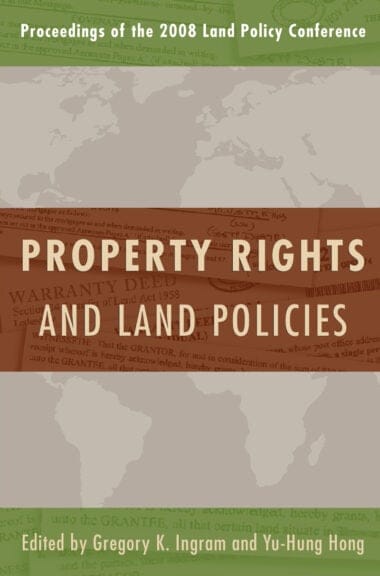Book

Property Rights and Land Policies
Edited by Gregory K. Ingram and Yu-Hung Hong
May 2009, English
Lincoln Institute of Land Policy
The Lincoln Institute’s third annual land policy conference explored the connections between property rights and land policies in developed and developing country contexts. The chapter authors discuss a range of land policy topics including regulatory takings, the use of eminent domain and expropriation in land assembly, the emergence of private property rights in transition economies, marketable emission permits, natural resource management, and the impacts of tenure choice on land and housing development.
About the Editors
Gregory K. Ingram was the CEO and president of the Lincoln Institute of Land Policy from 2005 to 2014.
Yu-Hung Hong was a fellow at the Lincoln Institute of Land Policy.
Table of Contents
Introduction
1. Examining Land Policies from a Property Rights Perspective, Gregory K. Ingram and Yu-Hung Hong
The Design and Evolution of Property Rights Institutions
2. Design Principles of Robust Property Rights Institutions: What Have We Learned? Elinor Ostrom
3. U.S. Private Property Rights in International Perspective, Harvey M. Jacobs
4. China’s Land System: Past, Present, and Future, Dwight H. Perkins
Commentary: Scott Rozelle
5. Property Rights and Real Estate Privatization in Russia: A Work in Progress, Bertrand Renaud, Joseph K. Eckert, and R. Jerome Anderson
Commentary: Robert M. Buckley
6. Developing Land Markets Within the Constraint of State Ownership in Vietnam, Stephen B. Butler
Commentary: Annette M. Kim
Public Compensations for Takings
7. The Use of Eminent Domain in São Paulo, Bogotá, and Mexico City, Antonio Azuela
Commentary: Vicki Been
8. The Myth and Reality of Eminent Domain for Economic Development Practice, Jerold S. Kayden
Commentary: John D. Echeverria
9. Property Rights Protection and Spatial Planning in European Countries, Vincent Renard
Commentary: Barrie Needham
10. Should Decreases in Property Value Caused by Regulations Be Compensated? Abraham Bell
Commentary: Perry Shapiro
Property Rights Approaches to Achieving Land Policy Goals
11. Land Registration, Economic Development, and Poverty Reduction, Klaus Deininger and Gershon Feder
Commentary: Alain Durand-Lasserve
12. Looking Beyond Land Titling and Credit Accessibility for the Urban Poor, Edesio Fernandes
Commentary: Ernesto Schargrodsky
13. Property Rights Created Under a Federalist Approach to Tradable Emissions Policy, Dallas Burtraw and Rich Sweeney
Commentary: Wallace E. Oates
14. Private Conservation Easements: Balancing Private Initiative and the Public Interest, Gerald Korngold
Commentary: Nancy A. McLaughlin
15. The Role of Private-Sector Developers in Challenges to Local Land Use Regulations, Keri-Nicole Dillman and Lynn M. Fisher
Commentary: Alexander von Hoffman
16. The Mediocrity of Government Subsidies to Mixed-Income Housing Projects, Robert C. Ellickson
Commentary: Ingrid Gould Ellen
Keywords
Appraisal, Brownfields, Common Property, Community Development, Conservation, Conservation Easements, Development, Dispute Resolution, Easements, Economic Development, Economics, Eminent Domain, Environmental Management, Ethics, Farm Land, Globalization, Growth Controls, Growth Management, Housing, Informal Land Markets, Infrastructure, Land Law, Land Market Monitoring, Land Market Regulation, Land Monitoring, Land Use, Land Use Ethics, Land Use Planning, Land Value, Legal Issues, Local Government, Natural Resources, Open Space, Planning, Poverty, Public Policy, Regulatory Regimes, Reuse of Urban Land, Security of Tenure, Smart Growth, Spatial Order, Sustainable Development, Tenure, Transportation, Urban, Urban Development, Urban Revitalization, Urbanism, Value Capture
